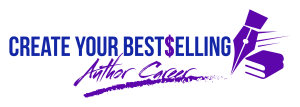 Some writers have visions of grandeur and wholeheartedly believe they can achieve the big dreams and goals they have for themselves and their careers. More commonly, writers—like a lot of other people—doubt their ability to achieve success. Therefore, they create goals and dreams that fit the mental construct they have created. They think and dream small.
Some writers have visions of grandeur and wholeheartedly believe they can achieve the big dreams and goals they have for themselves and their careers. More commonly, writers—like a lot of other people—doubt their ability to achieve success. Therefore, they create goals and dreams that fit the mental construct they have created. They think and dream small.
In my last post I wrote about attitude as the biggest obstacle you must overcome if you want to succeed as an author. Thinking small relates to attitude, because it stems from limiting beliefs and thoughts about yourself.
To succeed as a writer or an author requires a willingness to dive deeply into your mind and discover what stops you from thinking big. And I don’t mean only understanding why you don’t believe you can create a bestselling book—or even write a book someone will read.
You need to figure out why you aren’t thinking big in terms of your career.
That Story About the Boy Who Was Told He Couldn’t Write…
I’ve heard numerous renditions of the same story. I’ll tell it to you the way I remember it… A young boy has a dream of becoming a writer or author. He writes story after story at home on his own. One day his teacher asks him to write a story and turn it in as a homework assignment. He eagerly does so and anticipates the feedback he will receive—feedback he assumes will encourage him to continue writing and pursue a career in publishing. The paper comes back marked “D.”
Stunned, he takes the paper to the teacher and says, “I’ve been writing for years! I have a dream of pursuing a career as a writer and author. Why did you give me such a low grade?”
The teacher, in her great wisdom, replies, “You just aren’t a very good writer.”
And the young man stops writing.
Later in life he begins again, but he is afraid to submit his work to magazines, websites or publishers. He won’t start a blog or join a critique group. Yet, he still dreams of becoming an author.
Do Your Limiting Beliefs Make You Think Small?
What happened to this young man is common. Because of one incident early in life he adopts the limiting belief that he isn’t a good enough writer to pursue a career as an author. He decided to believe this one person—his teacher—even though she might have been, and very likely was, wrong about his ability. And that limiting belief affects the course of his life and career.
I can relate. When I was in high school I had the dream of becoming a novelist. My mother, in her great wisdom, told me “only good writers make a living as novelists.” I decided what she meant was: You don’t have the talent to make a living as a novelist. You aren’t good enough.
Because I wanted to write, I found another way to do so: as a magazine journalist. Later, I became a book editor and then started writing books of my own, but only nonfiction.
Here’s the thing: More often than not, our limiting beliefs are based on events in our past that simply aren’t true.
No one told me I wasn’t a good enough writer to have a career as a novelist. That young man only got one opinion on his writing before he decided to give up on his dream of a writing career.
Guess what? If you follow the young man’s story until the end, you discover that he finally did submit a manuscript to a publisher and got published. Not only that, he became a bestselling author—many times over. As for me, I’ve written hundreds of articles for regional and national publications, and I’m a bestselling nonfiction author. Plus, I have the draft of one novel finished, and when I entered the pitch contest at a writers conference, I won! (Now I just need to edit the manuscript!)
Think Big
Once you realize that your limiting beliefs keep you thinking small, you can start thinking big. That’s when the magic happens.
When you have a grand vision of your success, you can stretch and reach for it. And you open the opportunity and possibility of achieving it.
As long as you think small, you get small results. Think big, and you get big results.
If you want to become a successful author, thinking big is essential. Unless you are one of the elite bestselling authors who makes a living from royalties alone (and there are few of these), your vision of success, and your plan of how to achieve it, need to include more than one book. In fact, successful authors tend to write numerous books in numerous ways (indie and traditional) and, especially for nonfiction authors, become authorpreneurs. They add a variety of products and services into the mix. Often they become members of the expert industry, which means they are authors, speakers, trainers or coaches, and offer a variety of products and services online and off.
Successful authors plan for a bestselling author career. And then they pursue that plan…always thinking big, stretching….and working hard to keep their limiting beliefs from holding them back.
3 Ways to Stop Thinking Small and Start Thinking Big
So how do you stop thinking small and start thinking big instead? Here are three tools to help you move from limited to unlimited beliefs:
- Each time you find yourself thinking a limiting thought, ask: Is this the truth? Is there any validity to your belief that “No one will want to read what I write,” “I am not good enough to write a bestselling book,” or “I can’t do that”? If you can’t back up that thought with concrete evidence, and lots of it, discard the thought. If you do come up with some evidence, look for evidence to the opposite. Have people enjoyed reading what you write? Were there times you received feedback that you are a good enough writer, and do you typically achieve whatever you set your mind to doing? Allow the positive evidence to sway your belief system in such a way that you begin thinking big.
- Use affirmations. These positive statements used to convince your conscious and subconscious mind that something is true have proved enormously helpful to many people, including such bestselling authors as Jack Canfield (Chicken Soup for the Soul). For each one of your limiting thoughts or beliefs, write an affirmation. For example, maybe you often think you shouldn’t try to land a traditional publishing deal because your ideas aren’t unique enough. You might affirm, “I now create unique ideas that publishers find compelling and marketable and are eager to purchase from me.” Read this or memorize it, and say it numerous times per day but especially when you find yourself falling into old, negative thought patterns.
- Make affirmations of action. Limiting beliefs create inertia. The more you think you can’t or shouldn’t for whatever reason, the more you fight against doing the things you want to do, like pursuing a goal of creating a successful career as a writer. That’s why the best defense is to take action anyway. Write the book. Contact the agent. Send out the article. Produce a video. Begin the blog. When you do so and achieve any degree of success, you convince your mind that it is wrong. You break the limits of your limiting beliefs. Even if you encounter a few failures, keep going. Remind yourself that even the most successful authors failed at least a few times. But they didn’t let their negative thoughts get in the way of continuing onward toward their goals and dreams.
Here’s a bonus tip: Write a vision for the coming year. Or create a vision board, a collage, that depicts your success. Don’t think small when you do this! Think BIG! Then read the vision twice daily (or more), and place the vision somewhere that you can see it easily every day. When you read the vision or look at the vision board, feel as if you’ve already achieved your big, audacious goal. And allow any inspired actions to pop into your consciousness. (Record these immediately so you can add them to your affirmations of action.)
Think big. Act big. Dream big. Create big.
 Would you like to learn more about how to create a career as a successful writer or author? Click here to watch the fourth video in my four-part series and learn how to craft a bestselling book idea, how to write a bestseller, how to promote a book, and how to monetize your bestseller. Also, discover the details of my Create Your Bestselling Author Career premier coaching program. Registration opens January 15, 2015. Only 15 spots available.
Would you like to learn more about how to create a career as a successful writer or author? Click here to watch the fourth video in my four-part series and learn how to craft a bestselling book idea, how to write a bestseller, how to promote a book, and how to monetize your bestseller. Also, discover the details of my Create Your Bestselling Author Career premier coaching program. Registration opens January 15, 2015. Only 15 spots available.
LuAnn Braley says
I had the same kind of thing with Musical Theatre. I had wanted to be a stage actress since I was a small child. I started college as a Musical Theatre major. (Unfortunately at the time, I was painfully shy and could hardly bring myself to audition.) At the end of the year a professor wrote on an eval that I should ‘find something else to do beause (I) had no future in theatre’.
I believed that for 10 years, and eventually got a degree in Finance. But along the way, I went to an audition on a “what have I got to lose” basis. I got a part and did many, many plays over the next 5-6 years (until babies started coming along). It was SWEET! :O)
Nina Amir says
Luv it! Thanks for relating that story, Luann!
lidy says
I remember in high school how my Spanish language teacher told me how writing is just a hobby when I told her I wanted to be an author. Her response affected me so that I went on to major in Mass Communications as I couldn’t give up a career in writing completely. But then I took a Creative Writing class as an elective course in my Freshman year and I knew I was right where I belonged. Second semester I switched majors to English-Writing track but kept Mass Comm as a minor. I almost faltered again when a poetry editor sent a nasty rejection letter. But that time I had the comfort of my professor who believed in me. Of course life happened and children came along. Yet for the past two years I’ve been consistently blogging and have set up 2015 writing goals.
Nina Amir says
Good for you, Lidy…for following your intuition and for blogging and writing goals! Keep it up!